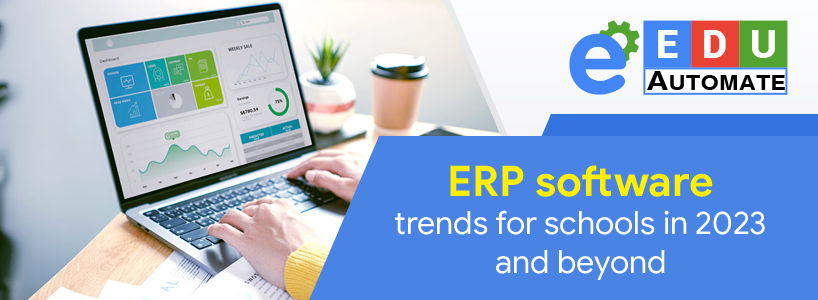ERP software trends for schools in 2023 and beyond
In the ever-evolving landscape of education, schools are constantly seeking ways to improve efficiency, streamline operations, and enhance the learning experience. Enterprise Resource Planning (ERP) software for School plays a crucial role in this endeavor, offering a centralized platform for managing everything from finances and admissions to student records and curriculum planning.
Here are some key trends shaping the ERP software for schoolsr Schools in 2023 and beyond:
- Cloud-based ERP: This model is rapidly gaining traction, offering scalability, accessibility, and automatic updates. Schools no longer need to invest in expensive hardware and IT infrastructure, making it a cost-effective and user-friendly option.
- AI and Machine Learning: These cutting-edge technologies are being integrated into ERP systems to personalize the learning experience, automate administrative tasks, and provide valuable insights into student performance. AI can analyze data to predict student needs and suggest interventions, while ML can automate routine tasks like scheduling and grading.
- Composable ERP: This approach allows schools to choose and integrate specific modules that meet their unique needs, rather than adopting a one-size-fits-all solution. This flexibility enables schools to tailor their ERP system to their specific curriculum, budget, and operational requirements.
- Data-driven decision making: ERP systems are becoming increasingly data-rich, providing valuable insights into school performance. Schools can utilize these insights to make informed decisions about resource allocation, curriculum development, and student support services.
- Enhanced security and compliance: With the rise of cyber threats, schools need to prioritize data security and compliance. ERP systems are evolving to offer robust security features and ensure adherence to data protection regulations.
- Mobile accessibility: Students, parents, and teachers are increasingly accessing school resources through mobile devices. ERP systems are being designed to be mobile-friendly, allowing users to access information and complete tasks on the go.
- Integration with other technologies: ERP systems are being developed to integrate seamlessly with other education technology tools, such as learning management systems (LMS) and student information systems (SIS). This integration facilitates a more holistic and streamlined approach to school management.
- Personalization: The one-size-fits-all approach to education is outdated. Schools are now focusing on personalized learning experiences that cater to individual student needs. ERP systems can support this trend by providing personalized dashboards, learning recommendations, and progress reports.
- Collaboration and communication: Effective collaboration and communication are essential for any school's success. ERP systems are being designed to facilitate better communication between teachers, parents, and administrators, fostering a more collaborative learning environment.
- Affordable and accessible: ERP systems are becoming more affordable and accessible to schools of all sizes. This makes it possible for even small schools to benefit from the efficiency and insights that ERP systems offer
